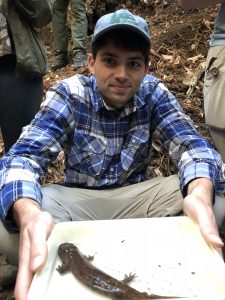
I am Kyle Leathers, a first-year PhD student interested in how aquatic communities are affected by environmental stressors, species interactions, and the combination between the two. My research investigates these topics, focusing on the effects of thermal regimes on stream food webs controlled by the predatory Coastal Giant Salamander (Dicamptodon tenebrosus).
I will apply observational, experimental, and modeling approaches to achieve realism, control, and generalizability in this research. Diverse pool-riffle sites throughout a watershed and artificial streams provide relevant scales for fieldwork and experiments respectively. I will use random forest algorithms to determine the relative importance of warming to community structure. Additionally, I will test food web stability using stable isotope analysis. My results will ultimately inform a Spatial Stream Network (SSN) model that predicts stream food-web structure and Coastal Giant Salamander abundance under future climate change scenarios. Understanding how food-web structure responds to increased water temperature can improve our ability to anticipate associated risks such as trophic cascades, pollutant bioaccumulation, and algal blooms.
